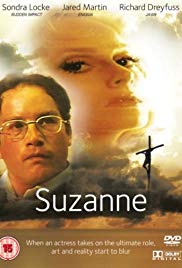
He treated me like a queen and I loved his voice. God how I loved his voice. Anyone who knows anything about Elizabeth Taylor and Richard Burton knows one thing above all else – they were never called Liz and Dick. Nobody would have dared. That aside, this is a gloriously kitschy exercise in flashback framed by an interview with them (that never happened in reality and culled from the many letters and notes Burton wrote to Taylor) in which they discuss their fatal attraction on the set of Cleopatra in 1962 , their subsequent adulterous relationship despite having children in their respective marriages, living together and making The VIPs and Who’s Afraid of Virginia Woolf (Taylor insisted), tricky divorces, their wedding, their peripatetic lifestyle and decision to live on a boat because of the living expenses of two families travelling from set to set and regular house moves in the middle of a never-ending international paparazzi hunt. It’s all here, with the immensely welcome if odd presence of the great Theresa Russell as Taylor’s mother Sara. Surely some mistake. Punctuated by fabulous jewellery, newspaper headlines, make-ups and bust-ups, heavy drinking, Taylor’s weight gain, Burton’s jealousy of her Academy Awards, the need to make films to solve financial problems and finally Burton’s alleged affair with Nathalie Delon which drove Taylor to a supposed assignation with Aristotle Onassis – at the centre of the chaos and tantrums is a couple whose sexual attraction to one another is overwhelming and quite incomprehensible to other people (a truism for most couples – the only thing these icons ever shared with mere mortals). What we have outside of the relationship is the nature of celebrity as it simply didn’t exist prior to this scandalous duo whose newsworthy antics even attracted the ire of the Vatican (‘erotic vagrancy’). Hello Lumpy! Lohan was roundly criticised for her portrayal and it’s true she doesn’t actually sound, look or move like Taylor but boy does she revel in the lines, like, Elizabeth wants to play. Strangely, she convinces more as the older Taylor with the frightwig and makeup. Bowler is adequate as Burton (even without the disproportionately large head) and underplays him quite well, but what is essential is what surrounds them – glamour, beauty, incredible locations. They literally had a dream of a life. What is clear in this evocation of the Battling Burtons is their need for constant reassurance and the one-upmanship resulting from their shared drive to always do better to keep on an even keel. I will love you even if you get as fat as a hippo. Burton’s descent into full-blown alcoholism upon the death of his brother Ifor (David Hunt) following a desperate fall in their home in Switzerland is the pivot to the real conclusion of the famous relationship, a second short-lived marriage following one of Taylor’s serious illnesses notwithstanding. There are a lot of books about them but if you want to see something as crazy, turbulent and tragic as they seem to have been, watch this. It’s wonderfully made, completely daft and utterly compelling. Written by Christopher Monger and directed by Lloyd Kramer. I want more






































